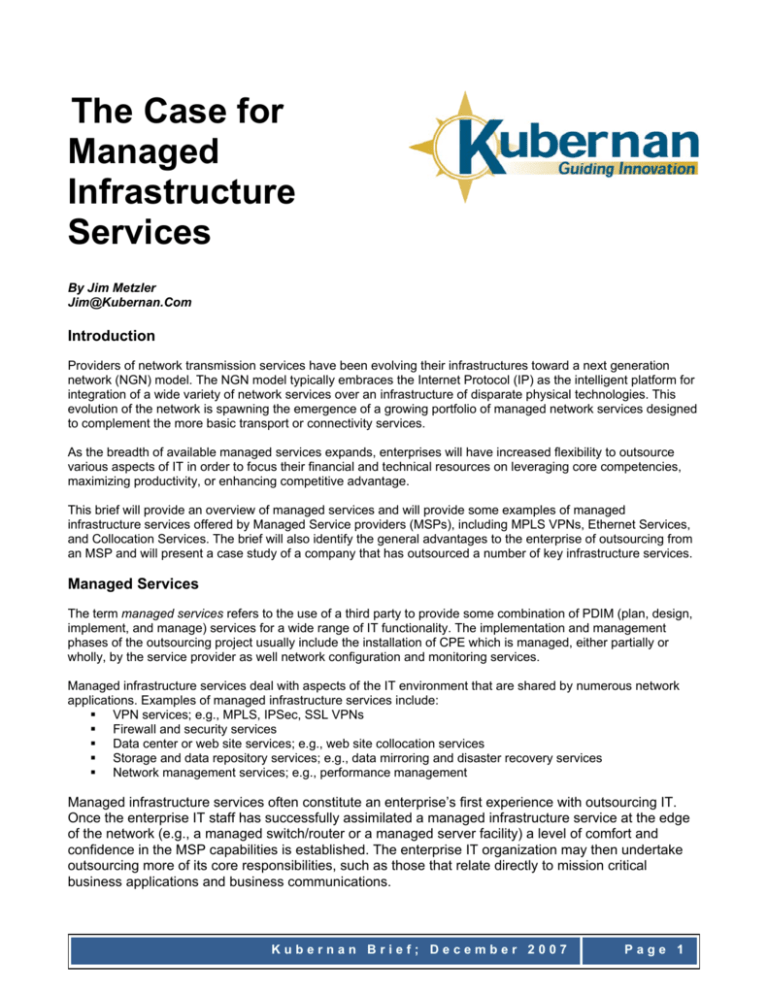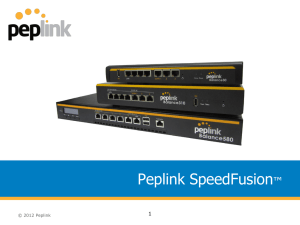The Case for Managed Infrastructure Services
advertisement

The Case for Managed Infrastructure Services By Jim Metzler Jim@Kubernan.Com Introduction Providers of network transmission services have been evolving their infrastructures toward a next generation network (NGN) model. The NGN model typically embraces the Internet Protocol (IP) as the intelligent platform for integration of a wide variety of network services over an infrastructure of disparate physical technologies. This evolution of the network is spawning the emergence of a growing portfolio of managed network services designed to complement the more basic transport or connectivity services. As the breadth of available managed services expands, enterprises will have increased flexibility to outsource various aspects of IT in order to focus their financial and technical resources on leveraging core competencies, maximizing productivity, or enhancing competitive advantage. This brief will provide an overview of managed services and will provide some examples of managed infrastructure services offered by Managed Service providers (MSPs), including MPLS VPNs, Ethernet Services, and Collocation Services. The brief will also identify the general advantages to the enterprise of outsourcing from an MSP and will present a case study of a company that has outsourced a number of key infrastructure services. Managed Services The term managed services refers to the use of a third party to provide some combination of PDIM (plan, design, implement, and manage) services for a wide range of IT functionality. The implementation and management phases of the outsourcing project usually include the installation of CPE which is managed, either partially or wholly, by the service provider as well network configuration and monitoring services. Managed infrastructure services deal with aspects of the IT environment that are shared by numerous network applications. Examples of managed infrastructure services include: VPN services; e.g., MPLS, IPSec, SSL VPNs Firewall and security services Data center or web site services; e.g., web site collocation services Storage and data repository services; e.g., data mirroring and disaster recovery services Network management services; e.g., performance management Managed infrastructure services often constitute an enterprise’s first experience with outsourcing IT. Once the enterprise IT staff has successfully assimilated a managed infrastructure service at the edge of the network (e.g., a managed switch/router or a managed server facility) a level of comfort and confidence in the MSP capabilities is established. The enterprise IT organization may then undertake outsourcing more of its core responsibilities, such as those that relate directly to mission critical business applications and business communications. Kubernan Brief; December 2007 Page 1 The category of managed services that support voice and integrated voice and data services may be referred to as Centrex, hosted telephony, hosted PBX, managed PBX, or managed unified communications (UC). UC itself may include a range communications, conferencing, and collaboration services. These services are also seeing a dramatic spurt in growth, and will be covered in a separate paper. Examples of Managed Infrastructure Services Providers of network transport services are rapidly increasing the breadth of their managed service portfolios as a means of expanding their revenue base beyond commodity transmission services. Managed infrastructure services, such as the ones described below, are gaining wide market acceptance and are available from most of the large, facilities-based service providers with varying degrees of availability in the different metropolitan areas that they serve. MPLS/IP VPN Services allow enterprises to gain the advantages of an MPLS/IP VPN as a fully or partially managed service. MPLS VPNs are secure, cost-effective alternatives to more traditional transport services offering the benefits of any-to-any IP connectivity among enterprise locations. In addition, MPLS Class of Service functionality supports integration of data, VoIP, and video over a single network service. If an enterprise selects a fully outsourced service, the MSP performs the MPLS VPN design, as well as provisioning/configuring/managing the CPE in additional to core networking monitoring and Service Level Agreement ( SLA) enforcement. Therefore, a fully managed MPLS VPN service can eliminate the need to invest enterprise human resources to master the complexities of MPLS technology. IP VPN services have been enhanced over the past few years with the growing availability of broadband connections delivered over the first mile through Optical and Ethernet services at speeds ranging from 10/100/1000 Ethernet to SONET services at speeds ranging from DS1 to OC-48. Ethernet Services offer the potential to greatly simplify MAN and WAN connectivity by extending the 10/100/1000 Mbps Ethernet network beyond the limits of the campus LAN. Ethernet services enable network transfers between sites at native LAN speeds while leveraging the familiarity, simplicity, and manageability of Ethernet network technology throughout the extended LAN or WAN. Ethernet services are typically highly costeffective, with lower cost per Mbps than any other MAN/WAN service. Ethernet services can also serve as the transport for IP VPN access and Internet access. As a fully managed service, Ethernet services generally include an MSP provisioned and managed CPE. Collocation Services provide a complete outsourced alternative to an on-premise Internet data center or web site. The Collocation data centers are generally located in prime metropolitan areas throughout the United States and other geographies and feature state-of-the-art physical server environments to ensure physical security and high availability of customer web sites. Web site operations are typically monitored 24x7 by operational staff with technical services available 24x7 to provide any remedial service that may be required to keep the site operating efficiently. Internet access for the collocation data centers is generally provided via high-speed connections between the MSP’s IP network and the Internet. The Advantages of Using Managed Infrastructure Services Many enterprises are finding that keeping pace with the rapid evolution of powerful, complex technologies, such as MPLS and VoIP, can require an excessive commitment of capital and human resources. To avoid stretching IT resources excessively or foregoing the benefits that these technologies offer, enterprises are adopting managed services as the vehicle for expanding IT capabilities to ensure that the business units are supported by a highly competitive IT infrastructure. Some of the specific benefits of using managed services include: Reduced Capital Expenditure In cases where the MSP provides the CPE as part of the service, the need for capital expenditure to deploy a new capability can be reduced or even entirely eliminated. Lower Total Cost of Ownership (TCO) In addition to reducing capital expenditure, managed services can also reduce operational expense for technical training of existing employees or hiring of additional personnel with scarce technical expertise. In terms of OPEX, the customer of managed services can also benefit from the lower Kubernan Brief; December 2007 Page 2 cost structure of MSP operations, which can leverage economies of scale by supplying the same type of service to numerous customers. Leverage of MSP Management Processes The MSP’s scale of operations also justifies investment in highly automated management tools and more sophisticated management processes that can greatly increase the productivity of operational staff, increasing efficiency and further reducing the OPEX cost component underlying the service. Higher Network Performance Levels The MSP’s ability to monitor and enforce strong SLAs that ensure quality of service results in increased network performance and efficiency. Leverage MSP’s Expertise In most cases, MSPs will have broader and deeper technical expertise than an enterprise IT organization can afford to accumulate. This higher level of expertise can result in full exploitation of every deployed technology including optimal service implementations and configurations that can increase performance, improve reliability, and further reduce TCO. Leverage MSP’s Technology Because of economies of scale, MSP facilities can take full advantage of the most advanced technologies in building their facilities to support service delivery. This allows the customer of managed services to gain the benefits of technologies and facilities that are beyond the reach of the typical IT budget. Leveraging Managed Infrastructure Services: A Case Study We interviewed the Network Engineering Manager for a customer using XO Communications as a Managed Service Provider (MSP) regarding how they benefit from these solutions. Business Challenges: • • • • Seamlessly connect 4 geographically disparate locations Support data center redundancy and disaster recovery Maximize uptime for broadband connectivity clients Leverage previous investments made in network infrastructure components The company is in the communications business, providing 3G cellular broadband connectivity for both primary and fail-over cellular backup. As such, they would not seem to be the prototypical customer for outsourced infrastructure services. However, because they literally run their business on their network, uptime is extremely important to them. The company has established geographically diverse data centers in order to achieve this, and XO was able to provide a collocation solution for one of those data centers to further support business continuity. Reduce MTTR and Leverage Staff: According to the customer, one of the primary reasons that they have outsourced one of their data centers is because the MSP is able to both increase the uptime of that data center as well as reduce the mean time to repair (MTTR) any faults. As the customer stated, “reducing MTTR is critical to us.” The Company was also motivated to be able to leverage the expertise of its employees as well as those of its MSP. The customer continued, “Managed services allow us to decrease the workload on our core team and removes the need for having certain expertise on staff 24 x 7, and yet still allows me to offer our clients the maximum uptime.” Flexibility: One of the traditional critiques of using managed services is that the service definitions tend to be unduly rigid. According to the customer, “By choosing the right MSP, one that offers a flexible approach to managed services, you can use them for as little or as much assistance as you need”. The company also uses an MPLS VPN service between its major sites, all of which are accessed using Ethernet services. However, since they already had their own routers, it was important for them to work with an MSP that could provide the level of service they needed without requiring on-premise routers. In addition, their MSP was able to provide connectivity to their location in Knoxville, TN a site that to which other service providers were not capable of providing connectivity. Why Managed Services Are More Important Now – Convergence: The customer has been in the IT business for over 20 years and has used managed services off and on during that time. He acknowledged the nearly universal movement to converged networks, stating, “With the growth in acceptance and migration to converged IP networks, managed services are now more important than ever.” He went on to state that MPLS is more complex than previous WAN technologies, but that there is also more capability to control the performance of MPLS than there was with previous WAN technologies. In his words, “An MSP can provide peace of mind when it comes to issues such as implementing and managing QoS in an MPLS network.” Kubernan Brief; December 2007 Page 3 Timely Deployment of Technology Building a new facility or incorporating a complex new technology in the enterprise network can be quite time consuming, especially where a significant amount of training or hiring is required. In contrast, with a managed service, the learning curve is essentially eliminated allowing the technology to be deployed in a much more timely fashion. Better Strategic Focus The availability of managed services can free up the enterprise IT staff required to improve the strategic alignment of in-house IT resources with the enterprise business objectives. For example, inhouse IT can focus on a smaller set of technologies and in-house services that are deemed to be of long term strategic value to the business. Enhanced Flexibility Managed services also afford a degree of flexibility that allows the enterprise to adapt rapidly to changes in the business environment resulting from competition or mergers/acquisitions. Table 1 provides the results of a subjective evaluation of the advantages an enterprise might expect to gain from each of the managed infrastructure service examples described earlier. The MPLS VPN service and the Collocation service both rate very highly (generally with 2 or 3 √ marks) in terms of the advantages described above. These scores reflect the fact that MPLS VPN and Collocation services are among the most widely deployed managed infrastructure services. Because the familiarity of Ethernet technology, the primary advantages of Ethernet managed services are the economic ones of lower TCO and lower $/Mbps of bandwidth. Reduced CAPEX MPLS VPN Ethernet Service Collocation Lower TCO Leverage Processes Leverage Expertise Leverage Tech Time to Deploy √√ √√√ √√ √√√ √√√ √√√ √√ √√√ √ √ √ √ √√√ √√√ √√ √√√ √√√ √√ Table 1: Relative Advantages of Managed Infrastructure Services Strategic Focus Flexibility √ √ √ √√ √√ √√ Summary A new generation of MSP is spawning the introduction of a wide range of managed services. As described in this brief, there are a number of reasons why enterprise IT organizations should consider implementing managed infrastructure services. In addition to their inherent benefits, the use of these services enables IT organizations to gain experience with outsourcing and hence positions the IT organization to feel more comfortable implementing a more extensive outsourcing strategy. It could be said that the advantages of using managed infrastructure services hasn’t changed in the last twenty years. What has changed significantly, however, is the context for using managed services. For example, reducing capital expenditures and lowering the TCO has always been important. However, given the extent and hence cost of today’s enterprise WAN, those factors tend to be more important today than they had been. Analogously, leveraging expertise has always been important. It is, however, more important today given the headcount restraints facing virtually all IT organizations combined with the introduction of new complex technologies such as MPLS. In the same fashion, flexibility and the timely deployment of technology have always been important. However, given the current pace of business, they are more important now than they have ever been. Kubernan Brief; December 2007 Page 4 A Word from the Sponsor – XO Communications XO Communications is a leading provider of telecommunications services exclusively to businesses. XO® services include local and long distance voice, dedicated Internet access, private networking, data transport, and Web hosting services, as well as bundled voice and Internet solutions. With more than a billion dollars in annual revenue, XO is a proven provider of IP bundled services, including the award-winning Voice over Internet Protocol (VoIP) services bundle, XOptions® Flex. XO operates an 18,000-route mile nationwide network that connects 75 metropolitan markets, and operates close to 900,000 miles of metro fiber. XO also offers an MPLS IP-VPN service that is ideal for medium-to-large businesses looking for operational advantages and savings associated with an IP-based wide area networking (WAN) solution. The XO MPLS IPVPN solution delivers more bandwidth for the dollar, faster application deployment, lower network operating costs, and more access options than traditional WAN services. To find out how XO can meet your specific networking requirements, visit http://www.XO.com or call 1.866.266.9696. About Kubernan™ Kubernan™, a joint venture of industry veterans Steven Taylor and Jim Metzler, is devoted to performing in-depth analysis and research in focused areas such as Metro Ethernet and MPLS, as well as in areas that cross the traditional functional boundaries of IT, such as Unified Communications and Application Delivery. Kubernan’s focus is on providing actionable insight through custom research with a forward looking viewpoint. Through reports that examine industry dynamics from both a demand and a supply perspective, the firm educates the marketplace both on emerging trends and the role that IT products, services and processes play in responding to those trends. Kubernan is the Greek root word for helmsman as well as the phrases to guide and to steer. As such, the name Kubernan reflects our mission of guiding the innovative development and usage of IT products and services. For more information and for additional IT Impact Briefs, please visit http://www.Kubernan.com. Kubernan Briefs Vol.1, Number 5 Published by Kubernan www.Kubernan.com Cofounders: Jim Metzler jim@kubernan.com Steven Taylor taylor@kubernan.com Professional Opinions Disclaimer All information presented and opinions expressed in this publication represent the current opinions of the author(s) based on professional judgment and best available information at the time of the presentation. Consequently, the information is subject to change, and no liability for advice presented is assumed. Ultimate responsibility for choice of appropriate solutions remains with the reader. Copyright © 2007, Kubernan For editorial and sponsorship information, contact Jim Metzler or Steven Taylor. Kubernan is an analyst and consulting joint venture of Steven Taylor and Jim Metzler. Kubernan Brief; December 2007 Page 5







